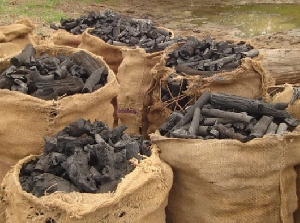The low quality of some locally produced charcoal is fuelling the desire of some Ghanaians to use imported ones, which consumers note are processed, efficient, clean and do not produce ash or sparks, Prosper Ahmed Amuquandoh, Inspector in-charge of Renewable Energy at the Energy Commission has said.
“Some of the charcoal that is produced locally produces ash, it burns faster – it is not efficient; and some of them, depending on the kind of tree that was used to produce the charcoal, produce sparks. For instance, if you use a shea nut tree to produce charcoal you are most likely to have sparks.
“But the imported ones have been processed, are efficient and clean, do not produce ash or sparks and are packaged. These and other factors are why people purchase the imported ones,” Mr. Amuquandoh told the B&FT in an interview.
According to him, even though the market for the imported product is not huge it is rising; and its existence is not because locals are not able to meet demand, but because some locals are not assuring the market of the quality needed.
He was however quick to add that some local producers have started producing quality charcoal, not only to satisfy local demand but also for export. These locals are being policed by the Energy Commission to ensure that they follow the laid-down regulations for production and export of the commodity.
Meanwhile, the B&FT has gathered that the Energy Commission is working to develop regulations for the local market to ensure their activities are not only sustainable but also environmentally friendly. The regulation will also deal with transportation, packaging and marketing of charcoal for local use. One of the key points in the regulations is to curtail the indiscriminate felling of trees for production of charcoal, which already exists in the regulations for export.
From available data via the Energy Commission, the majority of imported charcoal is consumed by households – especially middle to upper-class income earners. Also, charcoal constitutes the largest portion of energy usage in Ghana. One of the reasons for this development has been ascribed to cultural beliefs; that some delicacies taste better and are healthier if cooked with charcoal.
According to IndexBox, a leading market research publisher in the world, the global wood charcoal market revenue amounted to US$24.2billion in 2018 – remaining relatively unchanged against the previous year. This figure reflects the total revenues of producers and importers (excluding logistics costs, retail marketing costs, and retailers’ margins, which will be included in the final consumer price).
The market value increased at an average annual rate of +2.6% from 2007 to 2018; the trend pattern indicated some noticeable fluctuations being recorded throughout the analysed period. Global wood charcoal consumption peaked in 2018, and is likely to continue its growth in the immediate term.
The countries with highest volumes of wood charcoal consumption in 2018 were Brazil (5.5m tonnes), Ethiopia (4.4m tonnes) and Nigeria (4.2m tonnes). They together accounted for 28 percent of global consumption. These countries are followed by India, Democratic Republic of the Congo, Ghana, Tanzania, China, Thailand, Madagascar, Egypt and Zambia, which together accounted for a further 33 percent.
Source: thebftonline.com
 Home Of Ghana News Ghana News, Entertainment And More
Home Of Ghana News Ghana News, Entertainment And More





